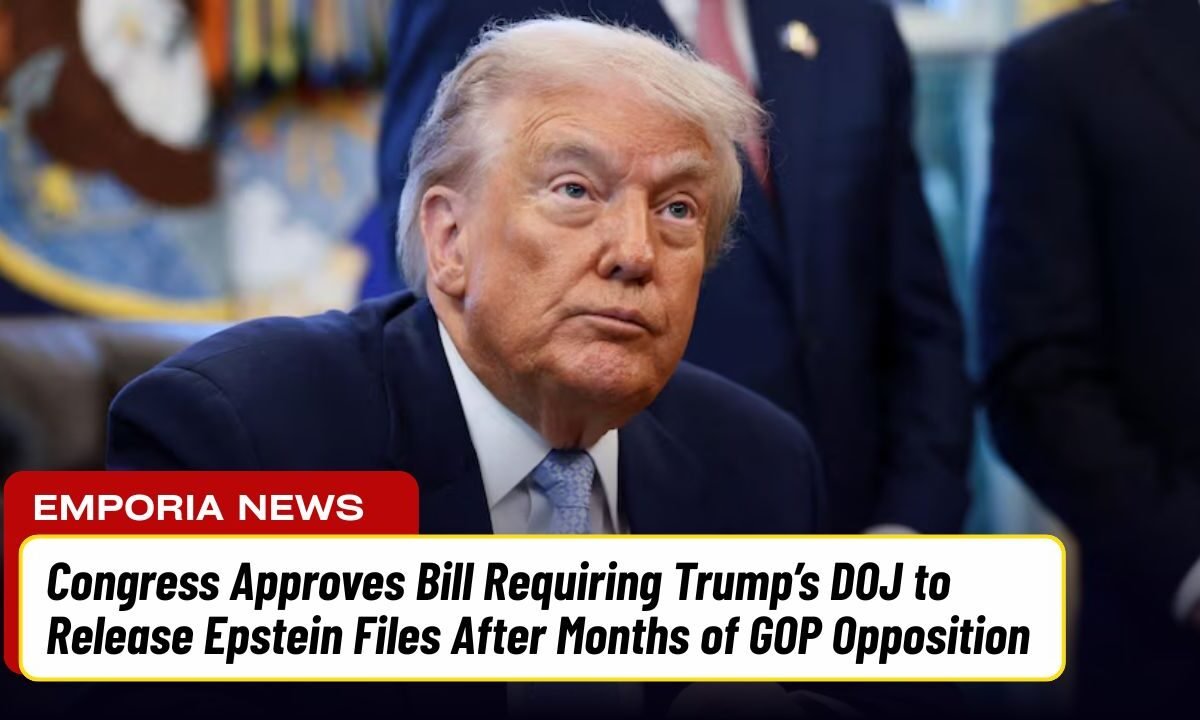In a dramatic shift on Capitol Hill, lawmakers have directed the Trump administration’s Justice Department to publicly disclose every investigative file related to convicted sex offender Jeffrey Epstein.
This decision comes after months of internal GOP battles and persistent clashes between party leaders and rank-and-file members pushing for transparency.
The measure—backed by nearly every Republican in both the House and Senate—now heads to President Donald Trump, who has pledged to sign it despite previously dismissing the issue as a “Democratic hoax.”
Congressional Approval Marks a Major Reversal
The bill’s rapid movement through Congress on Tuesday stood in sharp contrast to the fierce resistance displayed by Trump and GOP leadership over recent months.
A senior White House official confirmed that Trump will sign the legislation once it reaches his desk, even as he hosted the Saudi crown prince that same evening.
GOP Leaders Shift Under Pressure
After months of attempting to stall the initiative, major Republicans— including Speaker Mike Johnson and Senate Majority Leader John Thune—ultimately allowed the bill to advance.
Johnson had argued for additional protections to safeguard victims’ privacy, but Thune signaled he would not alter a bill that passed the House in a staggering 427–1 vote.
Johnson later explained that Republicans wanted to publicly demonstrate support for transparency, even if many had originally opposed the measure.
Massie-Led Push Forces GOP to Relent
The turnaround represents a major victory for Rep. Thomas Massie, the Kentucky Republican who spearheaded the bipartisan effort, supported strongly by Democrats.
He noted that supporters had overcome resistance from the president, attorney general, FBI director, the Speaker, and the vice president to advance the measure.
Although Trump and his allies had attacked Massie for weeks—including personal insults and threats of a primary challenge—Massie welcomed Trump’s eventual decision to get behind the bill, saying it “strengthened his position.”
Growing Rift Within the GOP
Republican support for releasing the files also deepened existing tensions within the party. Rep. Marjorie Taylor Greene, once a close Trump ally, aligned herself with Massie on the transparency effort. Trump retaliated by branding her a “traitor” and calling for her removal via a primary challenge.
One lawmaker, Rep. Clay Higgins of Louisiana, broke with his party and voted against the bill, arguing that its language undermines established criminal justice protocols and could inadvertently expose innocent individuals, including witnesses and family members.
How the Push for Release Gained Momentum
Ironically, Trump himself initially fueled Republican interest in the Epstein investigation, frequently questioning the circumstances of Epstein’s death and promising to declassify relevant files while on the campaign trail.
Top Trump-appointed DOJ officials reinforced this narrative. In 2023, Kash Patel suggested the so-called “Epstein list” remained secret due to the people named in it, and earlier this year, Attorney General Pam Bondi claimed the client list was literally “on her desk.”
Yet despite these assertions, no new information was released during Trump’s second term, creating significant frustration within his base. Many supporters accused the administration of withholding the very files Trump once vowed to make public.
The Procedural Gamble That Forced Action
With the White House and GOP leadership refusing to act, Massie partnered with Democratic Rep. Ro Khanna to use a rarely successful procedural strategy: a discharge petition. This tool allows a bill to reach the floor even without leadership’s approval—provided it secures 218 signatures.
That threshold was reached just days ago, with Democratic Rep. Adelita Grijalva supplying the final signature. She emphasized Tuesday that this was “a demand from the nation,” not a partisan cause.
The overwhelming bipartisan vote to force the release of the Epstein investigative files represents a historic moment of transparency, achieved only after months of internal conflict, procedural maneuvering, and mounting public pressure.
Although Republican leaders initially fought to suppress the measure, they eventually aligned with a coalition demanding accountability. Once President Trump signs the bill, the Justice Department will be required to disclose all files tied to one of the most controversial criminal cases in recent history.




